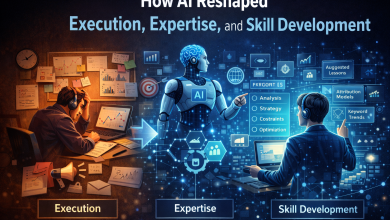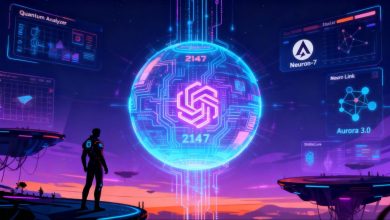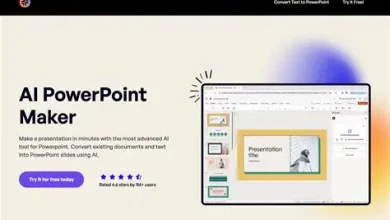
AI is no longer some futuristic concept; it is now embedded into nearly every industry. It is reshaping job functions across nearly every sector, from automating data entry in finance to streamlining diagnostics in healthcare.
Job seekers, especially recent graduates and those looking to transition into new careers, are entering a job market marked by rapid technological changes. AI is not just replacing roles; it is redefining how we work, search, and get hired. To succeed, today’s candidates must be both digitally literate and strategically human.
Here is how to stay competitive with practical, forward-thinking job search advice.
Understanding AI in the Workplace
With the widespread integration of AI, nearly every job will be touched by it in some way, regardless of industry. Some roles may be automated, while others will evolve to work in collaboration with AI. According to the World Economic Forum’s 2025 The Future of Jobs Report, 86% of companies plan to adopt AI and information processing technologies in the next five years. At the same time, 40% of employers plan to reduce their workforce in areas where AI can automate tasks.
This shift is most commonly apparent in repetitive tasks that can now be handled by AI-powered systems, such as data entry, scheduling, inventory tracking, and even basic legal review. By letting AI-powered systems handle these tasks, employees can focus on more strategic or creative responsibilities.
Additionally, companies are utilizing AI to boost productivity. Tools like management platforms or transcription software can boost efficiency and streamline communication, but using them effectively requires a certain level of digital fluency.
Job seekers do not have to become programmers, but they should understand the role of AI in their field. They can explore resources and AI guides to navigate these changes and build awareness and confidence around AI.
Adapt: Become Comfortable with AI Tools
There is no ignoring AI, so everyone should become comfortable with it. Rather than fearing it, job seekers should adopt a mindset that views AI as a tool to enhance performance, not a threat to employment. As NVIDIA CEO Jensen Huang put it, “You won’t lose your job to AI, you’ll lose your job to someone using AI.” Job seekers who shift their mindset to embracing AI as a productivity enhancer, not a replacement, will be far better equipped to stay relevant.
A good place to start is by using AI tools for job hunting – more than a third of candidates are already doing so, using tools like ChatGPT, Grammarly, Copilot, and LinkedIn’s AI resume builder. These platforms can help tailor resumes, improve writing, and offer guidance during interviews.
Job seekers should research how AI is implemented within their industry. Get comfortable experimenting in a low-stakes environment to build confidence. This hands-on familiarity provides a crucial edge in interviews and on the job.
Learn: Understand AI Fundamentals
AI is forever evolving. By building a strong foundation of how AI works and how it supports workplace functions, job seekers can enter the workforce with confidence. There is no need to learn how to code, but understanding the basics and terminology, as well as what AI can do, what it cannot, and where it is headed, can set a candidate apart in an interview.
Several accessible, beginner-friendly courses are available on platforms such as Coursera, LinkedIn Learning, and Google’s AI training hub. These resources cover everything from machine learning principles to responsible AI use, helping job seekers build knowledge without getting overwhelmed by technical jargon.
Understanding these fundamentals can help candidates ask better questions during interviews, assess the tools future employers may use, and think critically about where AI can enhance their performance. For those preparing for an NHS consultant role, exploring NHS consultant interview questions and answers alongside AI fundamentals can provide a well-rounded edge, ensuring candidates demonstrate both clinical expertise and an understanding of emerging technologies shaping healthcare.
Once job seekers have a grasp of the basics, it is essential to stay up to date as AI advances quickly. Subscribe to newsletters, follow industry experts on LinkedIn, and keep an eye on emerging trends. Staying curious and informed will keep job seekers ahead of the curve. In today’s market, staying current is part of being competitive, and it is some of the most practical job search advice out there.
Do Not Forget Soft Skills
In a world where AI can crunch the numbers, input data, and craft emails, human skills like empathy, adaptability, and collaboration still define workplace success. These soft skills perform where machines fall short – allowing people to navigate team dynamics, solve complex problems, and lead effectively.
Deloitte’s 2025 Gen Z and Millennial Survey finds that more than 85% of young professionals believe soft skills like empathy and leadership are more vital to long-term success than technical AI capabilities. Emotional intelligence and human judgment are qualities that AI cannot replicate. To that point, companies are increasingly prioritizing recruiting individuals who have both digital awareness and the ability to understand context, nuance, and empathy.
In today’s evolving job market, standing out means becoming the kind of candidate who can bridge the gap between AI insights and human interaction. Recent hiring trends show that the most successful candidates are not necessarily the most technically skilled, but they are the most adaptable, blending digital awareness with strong people skills.
Leverage AI in the Job Search
Having an understanding of AI tools will not only help job seekers in their actual roles, but it can also help them secure those roles. AI can help tailor resumes to a specific job description. For example, AI Chatbots can suggest keywords and align experience with the specific job description, improving chances of the resume passing through a company’s applicant tracking systems. Before submitting, always review to ensure all information is still accurate and revise to make sure it sounds authentic.
AI can also perform mock interviews, generating specific questions based on the job description. This provides job seekers the chance to receive feedback and refine their responses before the actual interview. It is just one more way to use AI and a practical piece of job search advice that can yield real results.
Last Piece of Job Search Advice: Be Proactive, Not Replaced
AI is here to stay and will only become even more embedded in how we work, collaborate, and grow. But that does not mean job seekers are at a disadvantage. Those who take the initiative to understand how AI is shaping their industry, develop digital fluency, and double down on human-centered skills will stand out in the modern job market.
The future of work is not about man versus machine. It is about people who know how to work with the machine – and lead with it as a human.





